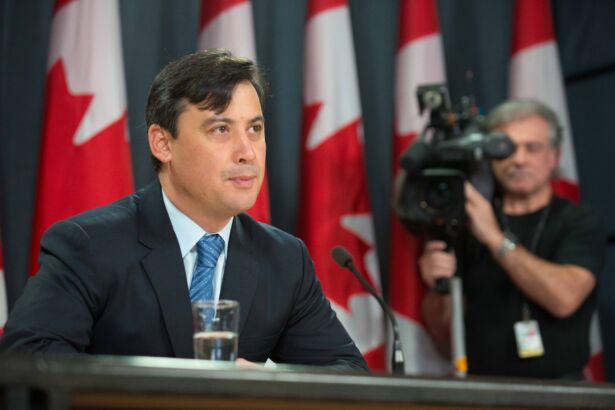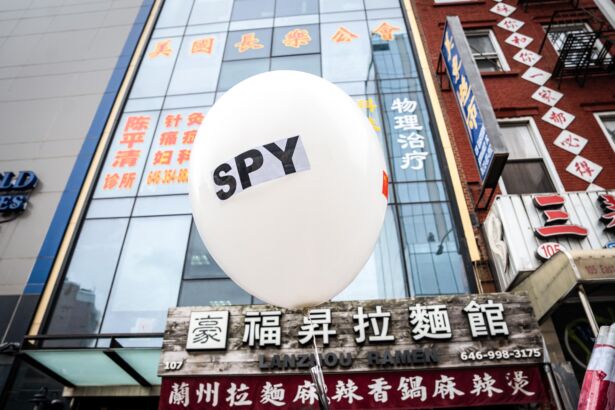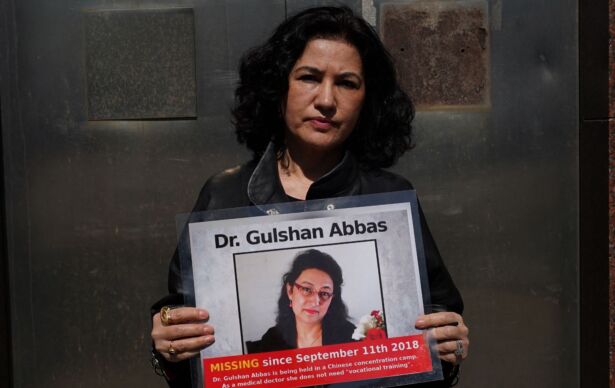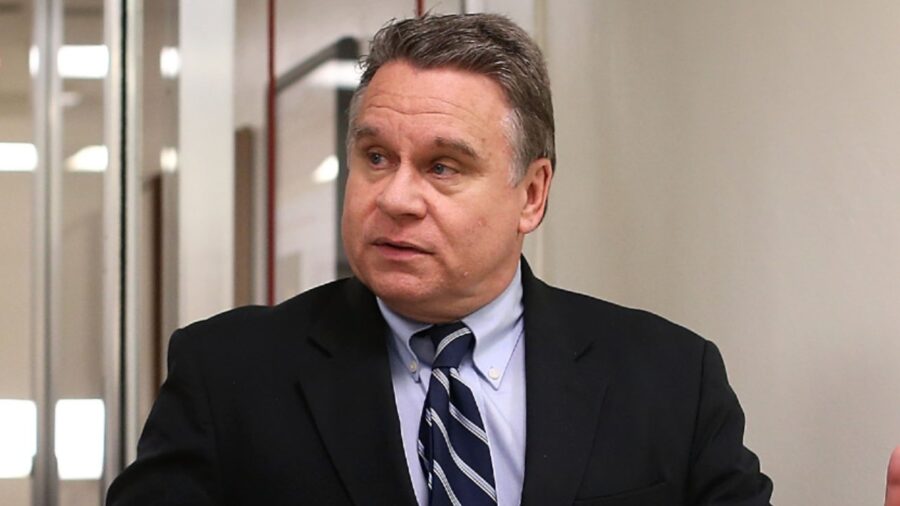The Chinese Communist Party’s (CCP) transnational repression, a pervasive scheme that extends far beyond its border and quells dissenting voices, came under the spotlight during a U.S. congressional body hearing on Sept. 12.
Witnesses, ranging from lawmakers to dissidents, gave their testimony before the Congressional-Executive Commission on China (CECC), a bipartisan and bicameral panel.
“The Chinese Communist Party has waged a pervasive, coercive campaign around the world against anyone who does not agree with the party,” Rep. Chris Smith (R-N.J.), who co-chairs the CECC, said in the opening remarks.
Mr. Smith recounted a giant sculpture in a California park morphing Chinese leader Xi Jinping’s head with a Coronavirus molecule. “It was a bold work of art rightfully assigning blame to the CCP and Xi Jinping, in particular, for the horrific pandemic and all the mistakes that were made, especially in the early months that shook the world,” he said.
Not long after it was unveiled in June 2021, the statue was vandalized and burned to the ground.
Charges unsealed by federal prosecutors in 2022 alleged three Chinese agents plotted to destroy the artwork and, more importantly, spy on the Los Angeles-based sculptor, who is critical of the CCP. The Justice Department accused the men of aiding the regime’s “transnational repression scheme” to silence dissidents living in the United States.
Unfortunately, that is not a rare case, Mr. Smith said.
Echoing his comments, Sen. Jeff Merkley (D-Ore.), co-chair of the CECC, described the number of uncovered cases related to the CCP’s transnational repression, both in the United States and other countries, as “disturbing.”
But there are likely to be countless cases that are not being reported on, he said.
“I imagine that for every case, we hear there’s another 10, we don’t know about,” said Mr. Merkley.
Earlier this year, Mr. Merkley introduced a bipartisan bill, the Transnational Repression Policy Act, together with Sens. Marco Rubio (R-Fla.), Ben Cardin (D-Md.), and Bill Hagerty (R-Tenn.). The legislative proposal, he said, is aimed at holding “foreign governments and individuals accountable when they stalk, intimidate, or assault people across borders.”
Yana Gorokhovskaia, research director for strategy and design at Washington-based think tank Freedom House, said the Chinese regime accounted for about 30 percent of all incidents of physical transnational repression her organization recorded.
“China is carrying out the world’s most sophisticated and comprehensive campaign of transnational repression using a wide array of physical, digital, and psychological tactics to attempt to silence those abuse as a threat,” Ms. Gorokhovskaia said.
The sweeping campaign targets a diverse array of overseas Chinese, including journalists, students, artists, and religious groups like Uyghurs, Tibetans, and Falun Gong practitioners, she said.
It also includes “anyone else who is brave enough to criticize the Chinese Communist Party,” she added, such as legislators.
Harassing Lawmaker
Michael Chong, a Canadian member of Parliament who was targeted by the Chinese regime, said his story illustrates how Beijing’s translational repression or foreign interference works.
Mr. Chong, an opposition Conservative Party member, has often criticized the regime’s repression inside and outside China since he was appointed as the Shadow Minister for Foreign Affairs in 2020. Notably, he introduced a motion that declared Beijing’s abuse of Uyghur Muslims in the far-western Xinjiang region amounted to genocide, which the Canadian parliament later passed. The communist regime later responded by imposing sanctions on Mr. Chong along with two U.S. religious freedom officials.
In May, Mr. Chong learned through a Canadian newspaper, the Globe and Mail, that since 2020 a Chinese diplomat had gathered information to target him and his family in Hong Kong. The publication cited a July 2021 report by the Canadian Security Intelligence Service, and the existence of the internal assessment was later confirmed by the Canadian government, he said.
Mr. Chong learned last month that he and his family members were targeted by an online disinformation campaign in which the Canadian government said the CCP likely played a role.
The false narratives about him popped up on Chinese-language social media, particularly on WeChat, he said. The operation persisted for about a week in May.
“This is corrosive,” he said, noting there are over 1 million WeChat users in Canada and roughly 5 million across the world. “They have weaponized Chinese language social media [and] Chinese media, such as CGTN, the state broadcaster.”

The revelation resulted in the Canadian government declaring a Chinese diplomat, Zhao Wei, as “persona non grata” and demanded his departure on May 8. Beijing retaliated by ordering Jennifer Lalonde, a Shanghai-based Canadian envoy, to leave the country.
However, to protect his loved ones in Hong Kong, Mr. Chong said he had cut off contact with them and made sure that they could be, somewhat, insulated from the work he is doing in Canada, like many other Chinese diasporas in foreign countries.
“So this is the consequence, one of the consequences of [China]’s transnational repression,” he said.
“My experience is but one case of Beijing’s interference in Canada. Many, many other cases go unreported and unnoticed, and the victims suffer in silence,” he added.
Overseas Police Station
The most recent revelation of the transnational repression scheme is about Chinese police stations, which were uncovered by the human rights group Safeguard Defender last year.
According to an updated report released in December 2022, there are more than 100 police outposts that are operated in 53 countries, including four in the United States.
Laura Harth, campaign director of the Safeguard Defender, highlighted during the hearing that these facilities were the result of the cooperation between China’s public security authorities and overseas groups with ties to the CCP’s united front system, a powerful party organ that works to advance the regime’s interests abroad, including by carrying out foreign influence operations, suppress dissident movements, gather intelligence, and facilitate the transfer of technology to China.
The Chinese regime claimed these police outposts were to help overseas Chinese renew driver’s licenses and other tasks that are normally handled by consulates.
However, the reality is contrary to what Chinese authorities claimed. “Open-source evidence from Chinese authorities and State/Party media link such stations directly to ‘persuasion to return’ operations, including video evidence from such an operation in Spain,” Ms. Harth said.
Earlier this year, the FBI arrested two people accused of operating the outpost in New York City on behalf of the CCP. Federal prosecutors in Brooklyn said the police station was to “monitor and intimidate” Chinese dissidents inside the United States.
Ms. Harth noted these police stations “are clearly but the tip of the iceberg in what members of the dissident communities have long known.”

Safeguard Defenders have linked the “overseas police stations” to the CCP’s transnational scheme, Operation Fox Hunt, which was launched in 2014 to repatriate the CCP’s targets back to the mainland to face prosecution.
Under Fox Hunt and a broader Operation Sky Net launched in 2015, the Chinese regime claimed it had brought back nearly 12,000 people between 2014 and October 2022, Ms. Harth said, citing official data.
Ms. Harth explained the method, outside of formal extradition processes, was deployed by the CCP to coerce their targets to return to the mainland, and it ranged from kidnapping to intimidating family members in China.
“Threats and harassment, or worse, against family members back home or direct threats and harassment of individuals overseas by covert [China] agents, individuals linked to [Chinese] embassies or consulates, private investigators and security firms, coopted private individuals, rabid nationalists or even victims themselves,” she said.
“The Chinese Communist Party has set up a true whole-of-society effort to exert control over diaspora communities worldwide and silence dissent,” she added.
“These efforts clearly undermine the most fundamental freedoms of targeted communities, severely infringe the rights and due process of individuals coerced into returning, and constitute a grave violation of the territorial and judicial sovereignty of other nations,” she said. “The climate of suspicion and widespread fear further isolate targeted communities and individuals from their environment. They may also expose individuals that have been coopted or coerced into doing the CCP’s bidding to criminal liability,” Ms. Harth said.
She called for democratic countries to take “a similar whole of government approach that recognizes transnational repression for the domestic threat it is, one that is inextricably linked to the CCP’s influence operations.”
Silencing Uyghur
Rushan Abbas, who quit her full-time job as a business development director to become an activist after Beijing detained her sister, a retired medical doctor, gave evidence to the committee, recounting how the communist regime used transnational repression to silence Uyghurs.
In 2018, after receiving the news that 24 of her husband’s family members were missing and were likely detained by the authorities, she decided to expose it. “On September 5, 2018, I spoke about the growing number of the mass detention and exposed the CCP’s genocidal policies at the Hudson Institute, here in Washington.
“Six days later, my sister, [Dr.] Gulshan Abbas, was unjustly detained by the regime in retaliation for my activism, my free speech as a U.S. citizen.”
“Yesterday marks the fifth anniversary of her being taken from our lives.”
China’s state media accused Ms. Abbas of “fabricating” claims about her sister’s disappearances, but the authorities remain tight-lipped about her sister’s situation. The regime’s foreign ministry later confirmed her sister’s imprisonment, which she said was “all based on fabricated charges.”
Due to the CCP’s repression, Ms. Abbas said her husband had lost contact with his family members in China since April 2017.
“After over six years, all we know is that his father passed away seven months ago, the exact date and the circumstances surrounding his death are unknown.” Her mother-in-law, she said, “is set to be outside the camps, but she’s in poor health alone and has no one to take care of her because of her four children and all her grandchildren are still missing and likely detained.”
Over one million Uyghur and other Muslim minorities have been incarcerated in internment camps in China’s Xinjiang region, where they have been subjected to forced sterilization, torture, and forced labor. The United States and other Western democracies have labeled Beijing’s actions a genocide.
Ms. Abbas, founder and executive director of the Virginia-based Campaign for Uyghurs, told the committee the plight of her family members is “one of many Ughgurs in the United States are facing the most significant crisis of our lives.”
“But many of us are afraid to speak out because of what might happen to our lives back home in our homeland,” she said.

The FBI, the State Department, and other law enforcement agencies have contacted her, Ms. Abbas said, “but we don’t see any tangible help.”
“The CCP is an evident threat to freedom and democracy in the world. China’s international policing intimidation and harassment tactics extend to everyone,” she said.
Urging the United States to take a hard stance against the communist regime, she said, “If we do not stand and hold the CCP accountable today, we will most certainly lose the privilege tomorrow.”
From The Epoch Times


